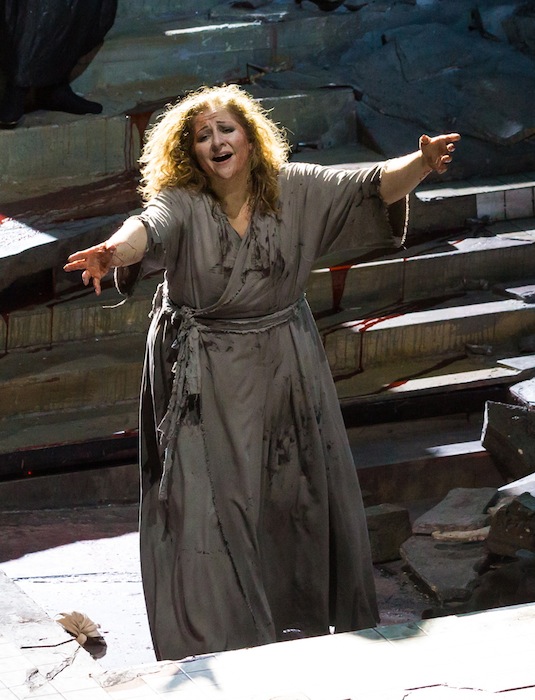Goerke and colleagues put across the violent intensity of HGO’s “Elektra”

Christine Goerke stars in the title role of Strauss’s “Elektra” at Houston Grand Opera. Photo: Lynn Lane
Christine Goerke’s stint as Brünnhilde in Houston Grand Opera’s staging of The Ring of the Nibelung climaxed last spring with her most powerful portrayal of the cycle: In Götterdämmerung (Twilight of the Gods), Goerke captured the warrior maiden’s heroism and heartbreak through her rich, blazing voice and commanding presence.
Yet the title role of Elektra shows that Goerke has an even more remarkable portrayal in her kit, revealed in HGO’s opening-night performance of Richard Strauss’s drama Friday at HGO’s Resilience Theater.
The first indication came as soon as she entered. Rushing into view, Goerke’s Elektra prowled the stage with a caged-animal ferocity that marked a complete change from the self-sacrificing nobility Goerke brought to Brünnhilde.
The familiar vocal heft remained. As the deranged protagonist invoked her slain father’s name– “Agamemnon!” “Agamemnon!”–Goerke filled it with a weightiness and depth that mirrored the horrific memories burdening the character’s mind. Elektra’s luxuriantly grisly description of her father’s death brought back the fierce, thrusting tones that made Brünnhilde’s burst of vengefulness in Twilight of the Gods so fearsome.
Yet it wasn’t all slasher movie, and Goerke and stage director Nick Sandys–taking the HGO reins for this David McVicar production–didn’t make Elektra an unvaried lunatic. Trying to envision Agamemnon as he had been in life, Goerke’s Elektra grew still, and she wrapped her arms around herself as if her father were still there to embrace her. Goerke’s voice transformed, too, gaining a new softness and tenderness.
In the midst of her ensuing bursts of vocal and histrionic ferocity, Goerke’s Elektra returned to those gentler strokes in key scenes. Conjuring up visions of normalcy for her sister Chrysothemis, she cradled soprano Tamara Wilson’s head in her lap and sang just as tenderly. After the shrouded stranger who appeared in Elektra’s home revealed himself as her brother Orest–played by bass-baritone Greer Grimsley–Goerke’s Elektra drew his head to her lap as she had Chrysothemis’s, and she welcomed his return in tones worthy of a lullaby.
When Orest fulfilled Elektra’s hopes of revenge on her father’s killers, Goerke’s voice rang out in exultant, swaggering phrases. I can only imagine the impact on listeners in the front rows, a mere 10 feet or so away from the stage.
(No orchestra pit divided them, because HGO’s temporary theater in Houston’s George R. Brown Convention Center doesn’t have one.)
In Chrysothemis’s scenes, Wilson brought a full-throated brightness to Strauss’s music that not only complemented Goerke’s richness, but suited a character who dreams of a normal life with husband and children. In the opera’s climax, Wilson’s voice flared up as exuberantly and vibrantly as Goerke’s.
Grimsley sang with a sepulchral darkness that befitted the gravity of Orest’s mission of vengeance.
As Klytaemnestra, Elektra’s mother, mezzo-soprano Michaela Martens put across the tormented woman’s sufferings in a voice that ranged from gutsiness to muffled, haunted whispers. Tenor Chad Shelton combined a staggering, drunken demeanor and bursts of vocal heft in his short scene as Aegisth, Klytaemnestra’s consort and co-conspirator.
The evening started arrestingly, thanks to the maidservants who described the unhinged heroine before she appeared. The five of them–Kathryn Day, Aryeh Nussbaum Cohen, Zoie Reams, Jennifer Root and Jennifer Check–not only sang with spirit and bite, but they scurried around like fearful animals as they dodged an overseer’s whip. Obviously, outlandish events were about to unfold.
Conductor Patrick Summers and the HGO Orchestra performed from behind the stage, as in previous performances at the Resilience Theater. The bulk of John Macfarlane’s unit set–dominated by a massive flight of steps that dripped with blood at the opera’s finale–stood to the audience’s left. The orchestra was placed at the back right.
There was a price to pay, of course. Strauss’s large orchestra didn’t come across with the force and color it would have in a normal pit setup at the front. As best one could tell through the distance, Summers and the group generally brought Strauss’s score the necessary vigor, momentum and dashes of lyricism. But the orchestral rampage after Elektra discovered Orest’ identity undeniably lacked visceral force. And at the other extreme, Strauss’ subtleties of tone-painting were diluted, losing some of their color. The orchestra unfortunately turned into more an accompaniment to the stage action than a full partner in Strauss’ story-telling.
But Goerke and the rest of the cast filled that sonic gap with vocal strength and dramatic nuance. The setup may have even freed Goerke and the rest of the cast to treat Strauss’ score to quiet, character-sketching touches that could have been lost if the massive orchestra had been between them and the listeners. It’s likely that no Elektra cast has ever had to struggle less to make themselves heard.
Elektra runs through February 2 at the HGO Resilience Theater in the George R. Brown Convention Center. houstongrandopera.org, 713-228-6737.